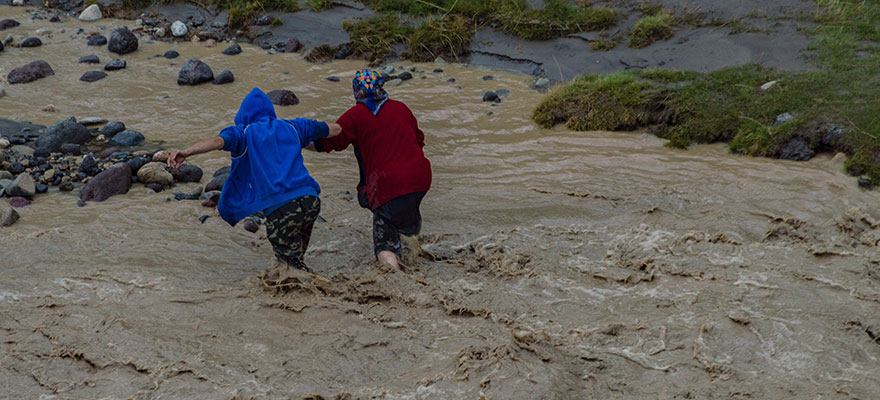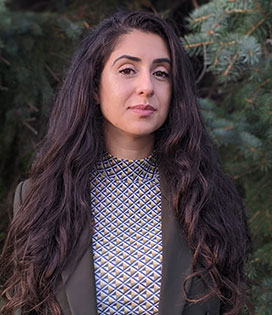Understanding the impact of natural disasters on women's health and wellbeing

By Todd Devlin
In the summer of 2022, heavy rains led to catastrophic flooding in Pakistan. The climate emergency left a third of the country underwater and impacted more than 30 million people. More than 1,700 fatalities were reported.
The floods caused the destruction of roughly 9.4 million acres of agricultural land – and the loss of 1.2 million livestock. Stagnant water led to a surge in vector-borne diseases, including dengue.
The fallout of the floods is being felt across demographics, but women and children are particularly vulnerable in the aftermath – particularly in the province of Khyber Pakhtunkhwa.

Anushka Ataullahjan, School of Health Studies
“We know, from other contexts, that climate change has gendered impacts, and that humanitarian crises, such as disasters, tend to really increase the gap for the most marginalized,” says Anushka Ataullahjan, an assistant professor in Western University’s School of Health Studies. “At the same time, the sociocultural context in the region, which limits women’s mobility, has really played an impact.”
To what extent have the floods in Pakistan had gendered impacts on women’s health and wellbeing? Ataullahjan is seeking to find out through research projects she’s carrying out in Swat, Khyber Pakhtunkhwa, a region populated by roughly 2.3 million people.
“The objective is really to understand the pathways through which the floods are impacting this specific group of women so there can be recommendations for policymakers and programmers to decrease that gap,” Ataullahjan said.
During a six-week trip to Pakistan in early 2023, the global health researcher met with leaders and laid the groundwork for participatory qualitative study to support her research program.
Ataullahjan is a critical qualitative researcher who draws on a variety of disciplines in her work, including anthropology, demography, and public health. Much of her work has taken place within Pakistan (and particularly in Khyber Pakhtunkhwa), where she’s studied issues like polio vaccination and family planning.
“My research really seeks to understand why people make the health decisions they do and what feeds into those decisions, specifically focusing on women’s health,” said Ataullahjan. “And then understanding how we can use that information to ensure we improve women’s health and wellbeing.”
“My research really seeks to understand why people make the health decisions they do and what feeds into those decisions, specifically focusing on women’s health.”
In Khyber Pakhtunkhwa, there are obstacles to achieving positive health outcomes for women. Factors include social, political and religious ideologies, as well as system of social exclusion, all of which must be understood in the history of the region.
“There are a lot of segregation norms that are really tied into ideas around female morality and how women’s bodies need to be regulated in public spaces,” Ataullahjan said. “This limits a woman’s interaction with non-familial men and can sometimes mean a woman can’t leave her house to access any type of care. So, when we’re thinking about something like antenatal care, for instance, that may be out of reach for many women.”
How can one remedy the limits of women’s mobility and work towards better healthcare and fewer lives lost? That question forms the basis of much of Ataullahjan’s global health research.
In leading research projects in Swat, Khyber Pakhtunkhwa, a region that experienced extensive flooding and infrastructure damage, Ataullahjan and her team must also navigate unique cultural and political realities.
Unlike with domestic studies, much of Ataullahjan’s global health research requires extra layers of work and preparation. For instance, she needs to gain not only ethics approvals but also No Objection Certificates (NOCs) from governments in the regions she visits. This allows the work to be done in the first place. She also needs to gain the trust of the locals.
“We’ve been lucky, we haven’t faced too much pushback,” Ataullahjan said. “I think that reflects the way we enter these village contexts. We spend a long time getting to know people and really building relationships, and we really emphasize that we’re there to improve health and wellbeing. I think that helps people feel more confident in what we’re doing. Building that trust is really, really important.”
While in Pakistan, it certainly helps that Ataullahjan is fluent in Pashto. She was born in Canada, growing up in Scarborough, but her parents are both from Pakistan, and she still has family there. This helps alleviate some of the ‘outsider’ status that many researchers come up against in the country.
In her specific area of work in women’s health and wellbeing, it also helps that she’s a woman herself. There are plenty of male researchers doing this work, too, but they run up against challenges that Ataullahjan can more easily overcome.
“Given the segregation norms, a man can’t go into a woman’s house and just sit with her and speak about her health,” she said. “I can go into those spaces and build that rapport. Relationships can be built over cups of tea. And because I speak the language, I’m not a complete outsider.
“This is an area I think I can potentially make an important contribution. I think my work can give these women’s voices a platform.”

